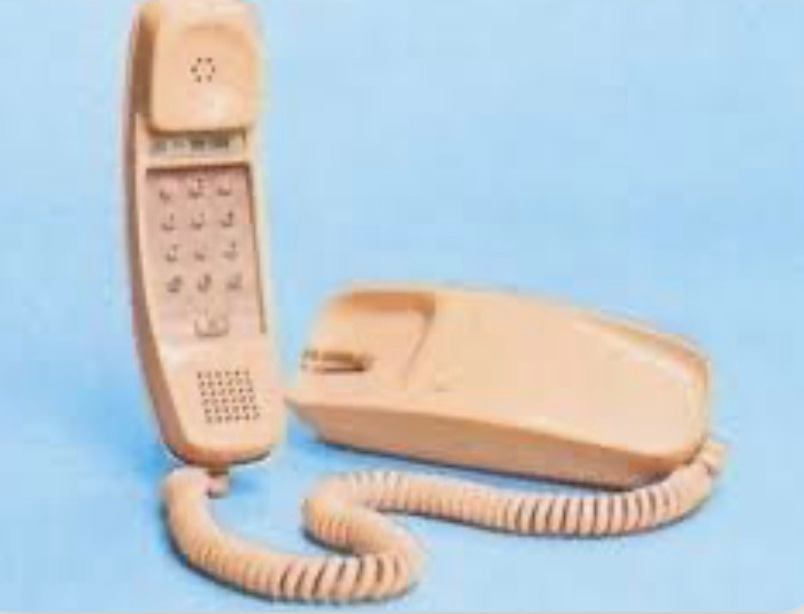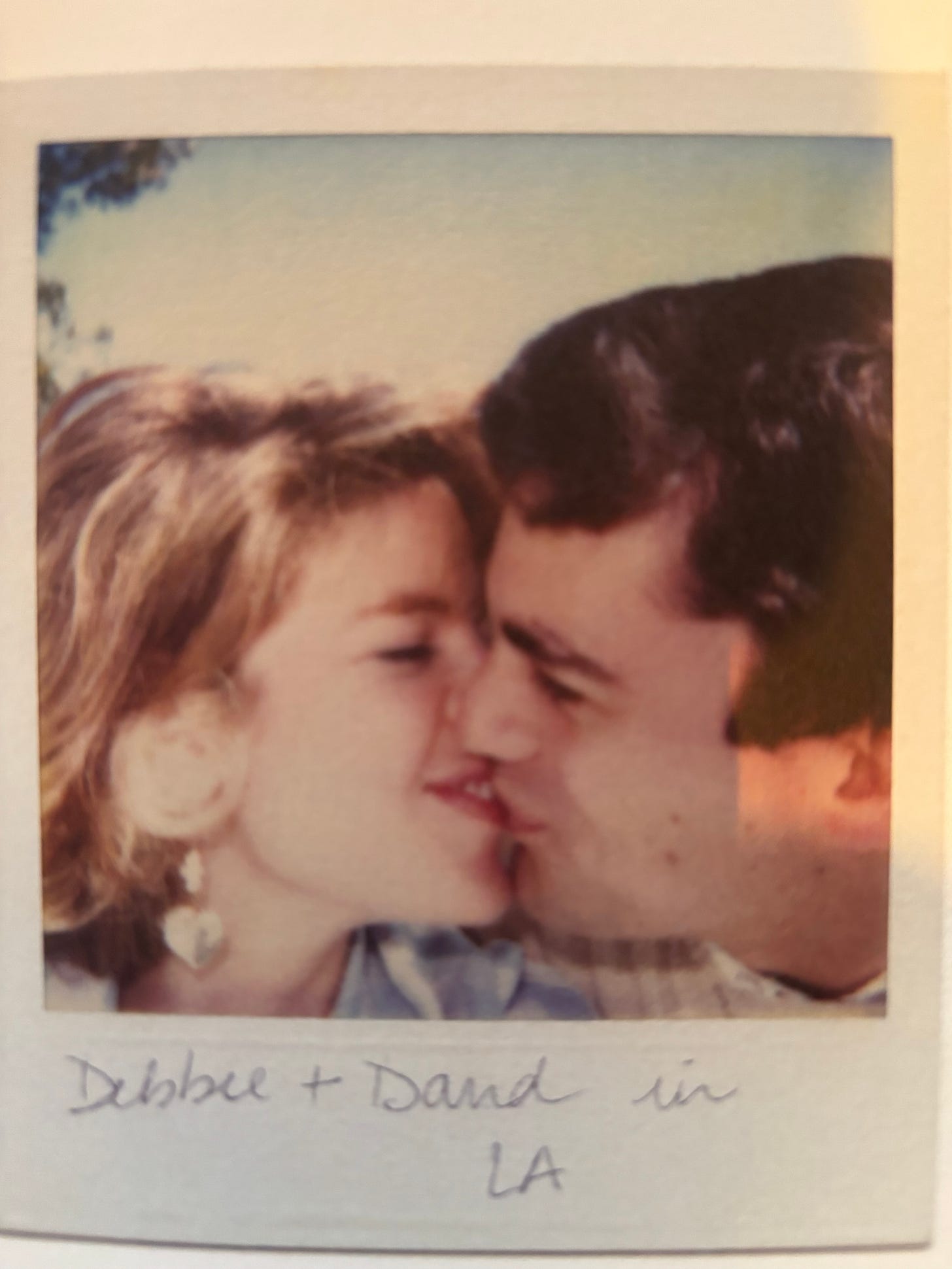High Value, Low Value
This post was sparked by a couple of intriguing essays by
(“CHH”). The essays are about the mating marketplace, intrasexual competition, and what makes men and women seem attractive to one another. Or as CHH bottom-lined it, “high value vs. low value.”I set out to apply CHH’s value criteria to the initial romance in 1984 between Debbie and me. It was revelatory in many ways, including how the power of our mutual attraction overcame behaviors by both of us that were objectively “low-value.” Also, thank god there was no internet in 1984.
When we met, I was 22 and Debbie was 21. She had a boyfriend. Neither of us were thinking in analytical or rational terms. We acted from passion and the bold foolishness of our tender years.
Value Criteria
Physical attraction is obvious. Perhaps wealth is too.
According to CHH, there’s not much controversy about what makes a man high value.
“[He’s] good looking, but that’s not all. He’s confident, he’s a good conversationalist, and he may or may not have a good job…”
To CHH, the controversy, or confusion, is about what makes a woman “high value”.
“Red pill men will insist on the “shy and polite” thing. Or they’ll say it’s all about looks, and there is no such thing as “game” for women—just be hot and show up…At the very most, “game” for women is being submissive, constantly available, and compliant. Drama-free.”
Contrary to the above, CHH believes that men consider women without “game” to be low-value and I agree. We all want what is not readily available. This is true for both women and men. Common sense and experience show that being challenging, assertive, and hard-to-get are high values for both men and women.
A man or a woman who is always agreeable, available, and amenable is low value. “Nice,” absent any edge, is boring.
To spar is to flirt
I’ve written about the night Debbie and I met in the post You Had Me At A Glance. My first impression of Debbie was her beauty even with her Halloween costume of a silver wig.
I didn’t take in the separate parts of her face. Rather it was a general impression of her beauty––symmetrical and soft, vital and radiant. Especially when she smiled.
Debbie and I debated things all that night. Neither of us exhibited the low value tendency to be overly agreeable. We debated the relative merits of the spreadsheet programs we each used (Lotus vs. Symphony), we debated the relative merits of our undergraduate business schools––her Babson vs. my Wharton. 1
Thank God there was no internet
What I didn’t find out until Debbie told me a few nights later was that she had a boyfriend Bob back at school, one semester behind her. Debbie and Bob had been dating for 18 months.
Once Debbie told me about Bob, most people would have told me to run the other way. In fact my friend told me to do exactly that. If Debbie was unfaithful to Bob, why wouldn’t she eventually be unfaithful to me?
But my reaction to her revelation was to say “I don’t care.”
That was an imprecise statement. Of course I cared that I had competition. I think what I mostly meant by not caring was that I was not deterred or put off by a rival.
And Debbie was in New York with me and Bob was back at Babson, invisible and remote for the time being. This was 1984––no Zoom, no emails, no texting, no cell phones. All we had were letters and phones like the one below.
I was willing to be “the other guy,” available and exclusive to Debbie as if Bob didn’t exist. No ultimatums from me. That’s low value behavior, mitigated, perhaps, by the high value of my confidence.
As for Debbie, she had high value because she had a boyfriend who I needed to displace. But it was low value behavior to cheat on Bob with me.
Debbie’s parents were on Team Bob
In Debbie’s eyes, my reticent behavior with her parents gave me a high value edge over Bob. He kissed up to them according to Debbie’s younger brother. He called them “Mr. and Mrs. B,” and stayed up late at night with Debbie’s dad assembling various mechanical devices. Bob was treated like a member of the family. Her parents adored him.
Debbie’s best friend Victoria told her that she and Bob seemed like brother and sister. Debbie wanted to be independent of her family. Bob was not the answer. His niceness cost him.
Spending too much money
In the first few weeks after we met, I took Debbie out to dinner almost every night. She told me she was worried I was spending too much money on her and wondered whether I’d be happier with a girl who had a trust fund like her friend Gail.
Debbie’s worries about money were an expression of Debbie’s self-doubt, although at the time I didn’t recognize it as such. I was in a stage of love where Debbie seemed flawless. Her hesitations about my spending money on her and whether she was wealthy enough for me seemed just one more facet of her perfection.
I told her that I could afford the dinners and that I didn’t need to be with someone with money because I had money of my own.
Debbie’s money-related concerns made her seem high value to me. She was not after me for money. (I can assure you this was not a ploy on her part; she is the most guileless person I know, a comically inept liar and actress.)
My “I already have money” response showed high value confidence, despite its arrogance.
Sexual jealousy and a power move
Eventually, the stress and jealousy of the romantic triangle came to a head.
When Debbie saw Bob in New York in the latter half of December, I was with my family in Palm Beach. I had intense sexual jealousy. I couldn’t stand the thought of Debbie with another man. On that vacation I was an absolute monster to my family.
Debbie had been stressed as well. When we were together in her apartment at night and the phone would ring, she’d assume it was Bob and it would give her a stomach ache.
I had arranged for Debbie and me to go on a trip to Los Angeles between Christmas and New Year’s. It was a high value power move on my part to remove her from New York and away from Bob.
Soon after we arrived in LA, Debbie announced she would break up with Bob to be with me exclusively. I was relieved. I didn’t think I could remain composed with Debbie any longer if she saw Bob again. Perhaps low value for me that she took for granted I’d be delighted that she was mine.
I remember feeling a mix of emotions at Debbie’s announcement. In addition to relief I felt very solemn. This was serious, no longer a game. Perhaps that’s always the feeling when you compete for somebody and you win. With the contest over, it’s natural to feel a sense of anticlimax.
Also, with my rival seemingly removed, I saw Debbie differently. It wasn’t that she was lower value but her value to me took on greater meaning. She had made a sacrifice for me so now I felt she was my responsibility. (While discussing this post, Debbie said her memory of me in that moment was that I was like “a deer in the headlights.”)
In some recess of my still unformed brain, I realized that her commitment to me would eventually have to be answered by my own commitment.
The word marriage didn’t occur to me immediately. But later that trip we went to Las Vegas for New Year’s Eve, and strangers asked us if we were on our honeymoon. That was an attractive conceit to both of us. At that moment, temporarily, we were beyond the value criteria.
Bob gets up off the canvas
Bob put up a fight. Throughout that winter, he sent flowers and long letters to Debbie. In one of the letters he asked Debbie to marry him and told her he had picked out a ring.
Debbie never wanted to hurt Bob. She cared for him. Each entreaty by Bob upset her. She asked me what to do to make Bob stop. I told her to say that if he sent more flowers and letters, she’d send the flowers and letters back to him. That did the trick.
Don’t make my mistake: when you cause your rival to stop sending flowers, it’s a blunder not to step into the very breach you created.
I was flattered that Bob pursued Debbie so ardently. High value for her. His pursuit and proposal also raised the stakes. Did his proposal hasten my own marriage proposal a few months later? I wasn’t conscious of it then, but thinking back on it, it must have.
Bob is our age––62––and we don’t think he’s ever been married. For him, Debbie may forever remain the girl that got away.
Incomprehensible
Seven months in, we were engaged; five months later, we were married.
We had no right to be so sure of ourselves. We were children soon to have children of our own.
My daughter Lauren turned thirty-seven this week. She has a toddler and a baby.
Lauren told me that we had some nerve bringing her into the world as early as we did. How could we, at her current age of thirty seven, believe we could be competent parents of her as a young adolescent? Lauren summed it up as “incomprehensible.”
Question for the comments: The always on communications technology of 2025 would probably have doomed my 1984 romance with Debbie. Does our current ease of communications hurt or help romance?
Debbie’s thoughts on my value
When asked this week what values she saw in me when we first met, Debbie said my intelligence, my humor, the fact that I had a job where I was relatively settled (I’d graduated a year earlier), and I was cute. My always-on availability was not a negative for her.









I don’t like classifying people as high or low “value,” particularly when money is part of the valuation. Of course, I’ve never had any money, so my value in that regard is close to zero. I never considered a person’s financial status when deciding whether to date. The things I looked at included intelligence, kindness, sense of humor, responsibility, trustworthiness, etc. Of course you have to find each other attractive and want the same kind of life. When I decided to marry my first husband, I took into consideration that we both were raised in small towns by still-married parents. I thought a shared background boded well. (He ended our marriage after 15 years and two children, so not so much.) However, I IMMEDIATELY knew I’d marry my second husband. It took only seconds for me to know. I called my dad and told him that night that I was going to marry a man I’d just met, a man who had just put everything he had into a new business in another country. He returned to his country (he was visiting American relatives) without us having so much as kissed. But sure enough, after two years of long-distance courtship, he gave up everything to move here and start over. Best decision of my life. We still have no money and never will but he is as high-value as they come.
Thanks for sharing yours and Debbie's story, David.
I met the love of my life through a blind date in 1986, pre-mobile phones or internet, which I'm really glad of. On our second date we arranged to meet after work by the escalator at Euston Station. I was delayed while on an assignment and was over an hour late for our rendezvous, with no way to let Ian know. He was waiting, reading a book, totally calm and relaxed and it just confirmed what I already knew: he was the one!